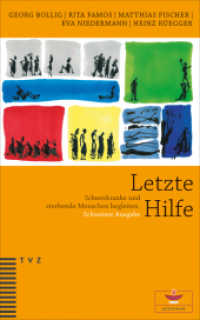- ホーム
- > 洋書
- > ドイツ書
- > Humanities, Arts & Music
- > Linguistics
Full Description
The book collects contributions from well-established researchers at the interface between language and cognition. It provides an overview of the latest insights into this interdisciplinary field from the perspectives of natural language processing, computer science, psycholinguistics and cognitive science.
One of the pioneers in cognitive natural language processing is Michael Zock, to whom this volume is dedicated. The structure of the book reflects his main research interests: lexicon and lexical analysis, semantics, language and speech generation, reading and writing technologies, language resources and language engineering.
The book is a valuable reference work and authoritative information source, giving an overview on the field and describing the state of the art as well as future developments. It is intended for researchers and advanced students interested in the subject.
One of the pioneers in cognitive natural language processing is Michael Zock, to whom this volume is dedicated. The structure of the book reflects his main research interests: Lexicon and lexical analysis, semantics, language and speech generation, reading and writing technologies, language resources and language engineering.
The book is a valuable reference work and authoritative information source, giving an overview on the field and describing the state of the art as well as future developments. It is intended for researchers and advanced students interested in the subject.
One of the pioneers in cognitive natural language processing is Michael Zock, to whom this volume is dedicated. The structure of the book reflects his main research interests: Lexicon and lexical analysis, semantics, language and speech generation, reading and writing technologies, language resources and language engineering.
The book is a valuable reference work and authoritative information source, giving an overview on the field and describing the state of the art as well as future developments. It is intended for researchers and advanced students interested in the subject.
Contents
Preface.- Michael Zock: A Life of Interdisciplinary Research and International Engagement. Mark T. Maybury.- Part I.Michael Zock and Cognitive Natural Language Processing.- Towards a Cognitive Natural Language Processing Perspective. Bernadette Sharp.- Cognitive Systems as Explanatory Artificial Intelligence. Sergei Nirenburg.- Part II.Lexicon and Lexical Analysis.- Lexical Contextualism: the Abélard Syndrome. Alain Polguère.- Predicative Lexical Units in Terminology. Marie Claude L'Homme.- TOTAKI: a Help for Lexical Access on the tip-of-the-tongue Problem. Mathieu Lafourcade and Alain Joubert.- Typing Relations in Distributional Thesauri. Olivier Ferret.- Multilingual Conceptual Access to Lexicon based on Shared Orthography: An ontology-driven study of Chinese and Japanese. Chu-Ren Huang, Ya-Min Chou.- Proportional Analogy in Written Language Data. Yves Lepage.- Multilingual Projections. Pushpak Bhattacharyya.- Part III.Semantics.- Personal Semantics. Gregory Grefenstette.- Accessing Words in a Speaker's Lexicon: Comparisons of Relatedness Measures through a Word Sense Disambiguation Task. Didier Schwab, Jérôme Goulian, Gilles Sérasset & Andon Tchechmedjiev.- Can Metaphors be Interpreted Cross-linguistically and Cross-culturally? Yorick Wilks.- Recursion and Ambiguity: a Linguistic and Computational Perspective. Rodolfo Delmonte.- Part IV.Language and Speech Analysis and Generation.- Consonants as Skeleton of Language. Statistical Evidences through Text Production. Kumiko Tanaka-Ishii.- How Natural are Artificial Languages? Rebecca Smaha & Christiane Fellbaum.- Handling Defaults and their Exceptions in Controlled Natural Language. Rolf Schwitter.- Ontology in Coq for a Guided Message Composition. Line Jakubiec-Jamet.- Bridging Gaps between Planning and Open-domain SpokenDialogues. Kristiina Jokinen.- JSREAL: A Text Realizer for Web Programming. Nicolas Daoust and Guy Lapalme.- Part V.Reading and Writing Technologies.- Simple or not, Simple... A Readability Question? Sanja Stajner, Ruslan Mitkov, Gloria Corpas Pastor.- An Approach to Improve a Language Quality of Requirements. Juyeon Kang, Patrick Saint-Dizier.- Learning from Errors. Systematic Analysis of Complex Writing Errors for Improving Writing Technology. Cerstin Mahlow.- Part VI.Language Resources and Language Engineering.- Language Matrices and the Language Resource Impact Factor. Joseph Mariani, Gil Francopoulo.- The Fips Multilingual Parser. Eric Wehrli, Luka Nerima.- The Lexical Ontology for Romanian. Dan Tufis and Verginica Barbu-Mititelu.- Quo Vadis: A Corpus of Entities and Relations. Dan Cristea, Daniela Gîfu, Mihaela Colhon, Paul Diac, Anca Bibiri, Cătălina Mărănduc, Liviu-Andreai Scutelnicu.- AusTalk and the HCS vLab: an Australian Corpus and Human Communication Science Collaboration Down Under. Dominique Estival.- Knowledge Services Innovation: When Language Engineering Marries Knowledge Engineering. Asanee Kawtrakul.








